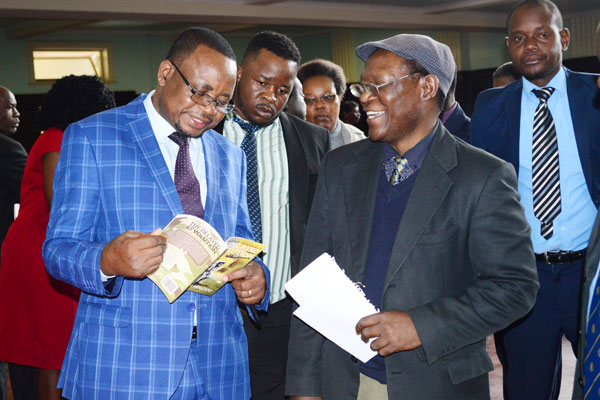
The foremost edition of the Zimbabwean International Book Fair (ZIBF) takes place in Harare from tomorrow to October 27, almost a month after the initial schedule was shelved over cholera fears.
the storyboard with Stan Mushava

With the health situation considerably under control, the book fair kicks off under the theme, The Book: Creating the Future. This year’s Indaba — the flagship seminar which opens the week-long festival — intersects reading with science and technology.
“The Zimbabwe International Book Fair Association (ZIBFA) shall put in place appropriate risk prevention and mitigation measures to ensure the safety and good health of all those who will attend the premier book fair,” interim chairperson Jasper Maenzanise recently said in a statement.
Good health does not look like a problem, considering the sheer amount of science up for discussion at this year’s book fair. Besides the generic talk about wiring into the future, talking points will include writing books for science, medicine, mathematics, engineering and technology.
ZIBF also dips into the United Nations and African Union alphabet soup this year, with areas of discussion, including “issues around Creative Cities in line with UNESCO’s agenda, arts and culture imaginations” and “regional and international development agendas such as Africa Agenda 2063 and the UN 2030 Strategic Developments Goals (SDGs).”
Perennial talking points include “the national book policy, intellectual property, copyright and eradication of piracy”. Personally, I would rather be on Whatsapp during this Grand Hotel Abyss session.
For almost a decade now, ZIBF has been featuring a long-form presentation or impromptu discussion on piracy, involving a minister, writers and publishers, with little or no evidence of action afterwards.
- Chamisa under fire over US$120K donation
- Mavhunga puts DeMbare into Chibuku quarterfinals
- Pension funds bet on Cabora Bassa oilfields
- Councils defy govt fire tender directive
Keep Reading
An all-stakeholders’ task force has even been convened by book fair organisers, but invasive piracy on the streets starkly contrasts with the board’s dutiful progress reports.
Maybe inviting the pirates themselves this year, and seating Sean Timba next to the police commissioner at the high table, will be a baby step from eloquent self-pity towards real action.
The technology discussion could be more convincing, given the signs of life in the industry. A couple of years back, major publishers, except for Weaver Press and amaBooks, insisted on doing business a quiet remove away from blogosphere and social media. The ZPH honcho said, at the time, publishers are capitalists who do things for the money, not for the buzz.
Thank God for cash shortages, in part, publishers have leaned into the e-commerce game, putting up websites, although these are more of online catalogues at the moment. A customer can go through different book categories, place an order over the phone and make a bank or mobile money transfer.
CPS has a halfway-to-upscale website while ZPH, College Press and Mambo Press also boast workable corners on the internet. The next area of improvement is plugging into the websites the capacity to do everything, including taking payments.
Furthermore, there must not be a mismatch between what the website says and how the publisher actually operates. The CPS website, for example, promises free shipment of books to the customer’s physical address but, in reality, you have to meet up with their local agent, which means staying posted on each other’s CBD rounds till everyone is equally free.
Publishers have commendably increased their visibility in the city centres, with some books sold in supermarkets or conveniently located bookshops. The prices too beat the pirate rate for the CPS-distributed African Writers Series and the ZPH-curated Zimbabwe Writers Series, though it would be great to invest more in contemporary fiction.
My biggest complaint with few major publishers is centralisation. Having to wait for every small order from Harare is bad business, bad optics and bad politics. Where there are headquarters, they must be sufficiently equipped, and where there are none, distribution can be outsourced.
Publishers, who will be wrapping their heads around tech utopias at the Indaba, may also want to discuss more on what they might be doing with the tools already available to them. I would love to see author pages run by publishers for their authors, and online content sheafed around classics we actually miss.
In any case, many label honchos do not seem to sleep over too many things, as long as they can sell textbooks to schools. It is not surprising that the National Arts Merit Awards, this year, noted a significant shift towards self-publishing at the expense of quality. This is because new authors are kicking and pushing on their own, as publishers have removed their hands from anything that is not for Zimsec, and picked up a reputation for exploiting the few successful authors who make it into their stables.
When I attended the Bulawayo edition of the book fair in June, it felt a lot more instrumental and academic than it was public and literary. You would see herded schoolchildren more often than book-crazy, random fellows. And, in a workshop on writing for the new curriculum, for example, you would think of yourself as lost in a teacher-to-teacher PowerPoint lecture.
The main edition of the book fair has traditionally been full-course affair, with a literary evening, a writers’ workshop and a little more on the entertainment side. This more public side of the book fair could be incorporated into future provincial editions.
Feedback: [email protected]











